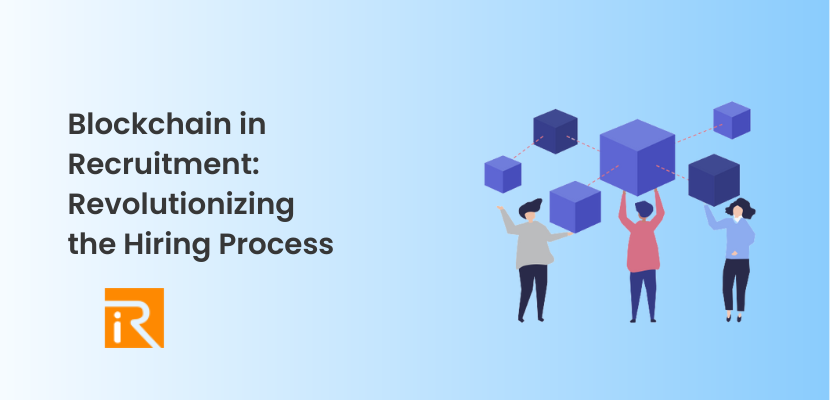
In recent years, blockchain technology has gained significant attention across various industries, and recruitment is no exception. The decentralized and secure nature of blockchain has the potential to transform the way we conduct recruitment processes, enhancing transparency, efficiency, and trust. So, in this article, we will explore the impact of blockchain in recruitment, its benefits, and the challenges associated with its implementation.
Understanding Blockchain Technology
Before delving into its application in recruitment, it is important to understand the fundamentals of blockchain technology.
What is Blockchain?
A decentralized digital ledger called blockchain records and verifies transactions across multiple computers or nodes. Each transaction, or block, links to the previous one, creating a chain of blocks. This distributed nature eliminates the need for a central authority and ensures transparency and immutability of the recorded information.
Key Features of Blockchain
Decentralization
One of the key features of blockchain is its decentralized nature. Unlike traditional centralized systems that rely on a single authority or intermediary, blockchain operates on a network of computers called nodes. These nodes work together to validate and record transactions, eliminating the need for a central authority. This decentralized structure brings several benefits, including increased resilience, as there is no single point of failure that can disrupt the entire system. It also reduces the risk of fraud or manipulation, as transactions are verified by multiple nodes in a consensus mechanism.
Security
Blockchain ensures security through the use of cryptographic algorithms. When someone initiates a transaction, they bundle it together with other transactions into a block and add it to the blockchain through a process called mining. Miners, who are participants in the network, compete to solve complex mathematical problems to validate the transactions and add them to the blockchain. When someone adds a block, they link it to the previous blocks, forming a chain of blocks, hence the name “blockchain.” The use of cryptography in blockchain ensures a high level of security, making it extremely difficult for malicious actors to alter or tamper with the data stored on the blockchain.
Transparency
Another important feature of blockchain is transparency. All participants in the blockchain network have access to the same information, which is stored in a public ledger. This promotes transparency and trust among stakeholders, as it allows for the verification and auditing of transactions by anyone in the network. The transparency of blockchain can be particularly beneficial in industries where trust is crucial, such as supply chain management or financial transactions. By providing a shared and immutable record of transactions, blockchain enables participants to verify the authenticity and integrity of the data without relying on a central authority.
Immutability
Immutability is a fundamental characteristic of blockchain. Once a transaction is recorded on the blockchain, it becomes part of a block, which is linked to the previous blocks in a chronological order. This link between blocks and the cryptographic hashing used in blockchain makes it practically impossible to alter or delete a transaction without being detected. Each block contains a unique hash, which is generated based on the data within the block and the hash of the previous block. Changing the data in one block would require recalculating the hash of that block and all subsequent blocks, which would be computationally infeasible. The immutability of blockchain ensures the integrity and reliability of the data stored within it.
Smart Contracts
Smart contracts are self-executing contracts with predefined rules and conditions encoded within the blockchain. They automatically execute and enforce the terms of the contract when the specified conditions are met. Smart contracts eliminate the need for intermediaries or third parties, as the execution and enforcement of the contract are carried out by the blockchain itself. This feature not only increases efficiency and reduces costs but also reduces the risk of fraud, as the terms of the contract are transparent and cannot be tampered with. Smart contracts have a wide range of applications, including supply chain management, financial services, and decentralized applications (DApps).
Consensus Mechanism
Consensus mechanisms are used in blockchain to achieve agreement among network participants on the state of the blockchain and the validity of transactions. Different consensus mechanisms, such as Proof of Work (PoW), Proof of Stake (PoS), and Delegated Proof of Stake (DPoS), provide different approaches to achieving consensus. In a PoW-based blockchain, miners compete to solve complex mathematical problems to validate transactions and add them to the blockchain. In a PoS-based blockchain, validators are selected based on the number of coins they hold, and they validate transactions based on their stake in the network. Consensus mechanisms ensure that all participants in the blockchain network agree on the order and validity of transactions, maintaining the integrity and security of the blockchain.
Scalability
Scalability is an important consideration in blockchain systems. It refers to the ability of a blockchain network to handle a growing number of transactions or users without sacrificing performance. Blockchain scalability can be achieved through various techniques, such as sharding, off-chain transactions, and layer-two solutions. Sharding involves dividing the blockchain network into smaller partitions called shards, allowing different nodes to process transactions in parallel and increasing the overall transaction processing capacity. Off-chain transactions involve moving certain transactions off the main blockchain and conducting them on secondary networks, reducing the load on the main blockchain. Layer-two solutions, such as payment channels or sidechains, provide additional layers on top of the main blockchain, enabling faster and more scalable transactions.
Interoperability
Interoperability in blockchain refers to the ability of different blockchain networks to communicate and interact with each other. It allows for the seamless transfer of assets or data between different blockchain platforms. The development of a connected and integrated blockchain ecosystem requires the crucial aspect of interoperability, where different blockchain networks can leverage each other’s strengths and capabilities. Developers are actively working on various projects and protocols to facilitate interoperability between different blockchain networks, enabling cross-chain transactions and data exchange.
Privacy and Confidentiality
While blockchain enthusiasts emphasize its transparency, it is also necessary to consider privacy and confidentiality in certain use cases. Although all participants can see the transaction details recorded on a public blockchain, the identities of the involved parties can be pseudonymous. Furthermore, there are private or permissioned blockchain networks that limit access to a specific group of participants, enabling enhanced privacy and confidentiality. Techniques like zero-knowledge proofs and encryption can enhance privacy in blockchain systems by allowing participants to selectively disclose information while upholding the overall security and integrity of the network.
The Potential of Blockchain in Recruitment
The recruitment process involves various steps, including identity verification, resume screening, background checks, and candidate data management. Blockchain technology has the potential to revolutionize these processes, offering numerous benefits to both candidates and employers.
Streamlining Identity Verification
Identity verification is a critical aspect of the recruitment process, ensuring that candidates are who they claim to be. Blockchain securely stores candidate identities on the decentralized ledger, reducing the risk of identity theft and simplifying the verification process for employers.
Securing Candidate Data
Candidate data privacy and security are major concerns in recruitment. By storing candidate information on the blockchain, authorized parties can encrypt and securely access the data, reducing the risk of data breaches and unauthorized access.
Improving Resume Verification
Blockchain can facilitate the verification of candidate resumes by storing educational credentials, work experience, and certifications on the blockchain. This allows employers to easily verify the authenticity of candidate information, eliminating the need for time-consuming manual verification processes.
Enhancing Background Checks
Background checks are crucial for ensuring the credibility and integrity of candidates. Blockchain can streamline this process by securely storing and sharing background check information, such as criminal records or employment history. This enhances transparency and reduces the reliance on intermediaries.
Benefits of Blockchain in Recruitment
The adoption of blockchain in recruitment offers several benefits that can positively impact the hiring process.
Adoption and Integration
The successful implementation of blockchain technology in recruitment requires the buy-in and cooperation of all stakeholders, including job seekers, employers, recruitment agencies, and regulatory bodies. Additionally, integrating blockchain with existing systems and processes may pose technical challenges that need to be addressed, such as data migration and compatibility issues.
Privacy Concerns
While blockchain ensures data security, privacy concerns may arise when storing personal information on a decentralized ledger. Striking a balance between data privacy and the transparency offered by blockchain technology is crucial. Implementing privacy-enhancing techniques, such as encryption or zero-knowledge proofs, can help address these concerns.
Scalability and Performance
Blockchain networks can face scalability and performance issues when dealing with a large volume of transactions. As recruitment involves numerous interactions and data exchanges, ensuring that the blockchain infrastructure can handle the demands of the recruitment process is essential. Scalability solutions, such as sharding or layer-two protocols, may be necessary to maintain efficiency and prevent network congestion.
Regulatory and Legal Implications
The use of blockchain in recruitment may raise regulatory and legal considerations. Compliance with data protection regulations, such as the General Data Protection Regulation (GDPR), is crucial. Additionally, ensuring that the use of blockchain aligns with legal frameworks, such as employment laws and anti-discrimination regulations, is vital to avoid any legal complications.
Challenges and Considerations
Despite its potential, the implementation of blockchain in recruitment comes with its own set of challenges and considerations.
Adoption and Integration
The successful implementation of blockchain technology in recruitment requires the buy-in and cooperation of all stakeholders, including job seekers, employers, recruitment agencies, and regulatory bodies. Additionally, integrating blockchain with existing systems and processes may pose technical challenges that need to be addressed, such as data migration and compatibility issues.
Privacy Concerns
While blockchain ensures data security, privacy concerns may arise when storing personal information on a decentralized ledger. Striking a balance between data privacy and the transparency offered by blockchain technology is crucial. Implementing privacy-enhancing techniques, such as encryption or zero-knowledge proofs, can help address these concerns.
Scalability and Performance
Blockchain networks can face scalability and performance issues when dealing with a large volume of transactions. As recruitment involves numerous interactions and data exchanges, ensuring that the blockchain infrastructure can handle the demands of the recruitment process is essential. Scalability solutions, such as sharding or layer-two protocols, may be necessary to maintain efficiency and prevent network congestion.
Regulatory and Legal Implications
The use of blockchain in recruitment may raise regulatory and legal considerations. Compliance with data protection regulations, such as the General Data Protection Regulation (GDPR), is crucial. Additionally, ensuring that the use of blockchain aligns with legal frameworks, such as employment laws and anti-discrimination regulations, is vital to avoid any legal complications.
Real-World Applications
Various areas of recruitment are already applying blockchain technology, demonstrating its potential to revolutionize the industry.
Verified Credentials and Certifications
Organizations can utilize blockchain to store and verify educational credentials, certifications, and professional licenses. Platforms like Blockcerts and Learning Machine enable individuals to securely store their credentials on the blockchain. Additionally, providing immutable proof of their qualifications. This helps employers trust the authenticity of candidate credentials and simplifies the verification process.
Decentralized Job Marketplaces
Blockchain-powered job marketplaces eliminate the need for intermediaries by directly connecting job seekers with employers. These platforms leverage smart contracts to automate the hiring process, ensuring transparency and efficiency. Candidates can access a wider range of job opportunities. Additionally, employers can directly interact with potential candidates, reducing costs and improving the overall hiring experience.
Payroll and Compensation Management
Blockchain can streamline payroll and compensation management by securely recording and automating payment processes. Using smart contracts enables the enforcement of transparent and timely payments, reducing administrative overhead and ensuring fairness. This helps both employers and employees by eliminating payment delays and disputes.
Candidate Feedback and Reputation Systems
Blockchain-based reputation systems provide a trustworthy platform for candidates to receive feedback and build their professional reputation. Additionally, these systems enable employers to make more informed hiring decisions based on verified feedback from previous employers or clients. This promotes transparency and helps create a reliable feedback ecosystem for the benefit of both candidates and employers.
The recruitment industry can potentially benefit from increased efficiency, trust, and security in the hiring process. Therefore, by leveraging the benefits of blockchain technology and addressing the associated challenges, the output can be seen.
Conclusion
Consequently, Blockchain technology is set to transform the recruitment industry. It involves enhancing transparency, security, and efficiency. Blockchain brings numerous benefits to recruiters, candidates, and organizations. Additionally, from facilitating trust and verification to streamlining background checks and improving candidate matching, . Although challenges exist, the potential of Blockchain in recruitment is immense. As technology continues to evolve, we can anticipate a future where recruitment processes streamline, become more reliable, and foster inclusivity.
FAQs
1: How does blockchain in recruitment ensure data security?
Blockchain in recruitment ensures data security through encryption, decentralization, and immutability. Multiple nodes store encrypted candidate data, ensuring high security and resistance to tampering or unauthorized access.
2: Can blockchain prevent resume fraud?
Yes, blockchain can help prevent resume fraud by securely storing candidate credentials and allowing employers to verify their authenticity. This reduces the reliance on trust and manual verification processes.
3: What challenges may arise during the implementation of blockchain in recruitment?
Adoption and integration challenges, privacy concerns, scalability and performance issues. Additionally, other challenges include regulatory and legal implications.
4:What legal implications arise from storing candidate data on the blockchain?
Storing candidate data on the blockchain may raise legal implications, especially in terms of compliance with data protection regulations. It is important to ensure that the use of blockchain aligns with the applicable legal frameworks.


























